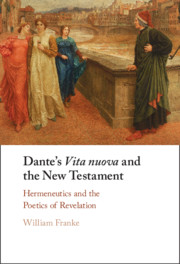Book contents
- Dante’s Vita nuova and the New Testament
- Dante’s Vita nuova and the New Testament
- Copyright page
- Contents
- Illustrations
- Prologue
- Acknowledgments
- Note on Text and Translation
- Chapter 1 Introduction: The Vita nuova as Theological Revelation through Lyrical Interpretation
- Chapter 2 The New Testament Model of Salvific Reminiscence
- Chapter 3 From Appearing and Imagining to Revealing through Interpreting: The Vita nuova’s Hermeneutics of Witness
- Chapter 4 Phenomenology versus Hermeneutics (Debate with Harrison): Revelation as Mediation
- Chapter 5 History of Effect and a New Hermeneutics-Oriented Critical Paradigm
- Chapter 6 Conclusion: The Existential Grounding of Revelation in Lyric
- Coda
- Epilogue: Dream Epistemology and Religious Revelation in Dante’s Vita nuova
- Appendix Italian Text and English Translation of the Vita nuova
- Index
Chapter 3 - From Appearing and Imagining to Revealing through Interpreting: The Vita nuova’s Hermeneutics of Witness
Published online by Cambridge University Press: 03 September 2021
- Dante’s Vita nuova and the New Testament
- Dante’s Vita nuova and the New Testament
- Copyright page
- Contents
- Illustrations
- Prologue
- Acknowledgments
- Note on Text and Translation
- Chapter 1 Introduction: The Vita nuova as Theological Revelation through Lyrical Interpretation
- Chapter 2 The New Testament Model of Salvific Reminiscence
- Chapter 3 From Appearing and Imagining to Revealing through Interpreting: The Vita nuova’s Hermeneutics of Witness
- Chapter 4 Phenomenology versus Hermeneutics (Debate with Harrison): Revelation as Mediation
- Chapter 5 History of Effect and a New Hermeneutics-Oriented Critical Paradigm
- Chapter 6 Conclusion: The Existential Grounding of Revelation in Lyric
- Coda
- Epilogue: Dream Epistemology and Religious Revelation in Dante’s Vita nuova
- Appendix Italian Text and English Translation of the Vita nuova
- Index
Summary
Dante’s life-transforming experience of Beatrice is at once a theophany and a poetic epiphany. It is made such particularly in and through its literary elaboration. Beatrice’s living appearances to Dante become inseparable from his imaginings of her in the complex weave of interpretations preserved in the book of his memory and in the existential witness of his poems. Dante’s rhetoric of appearing marks the visionary quality of his narrative and his verses, but it also underscores certain enigmas pertaining to the veracity of his personal experience of what is, for him, an unshakable truth. A proliferation of variants of his experience – whether of dissemblance or of death – riddles Dante’s testimony to one incomparable person and event. As in the fourfold Gospels, experience of the transcendent is inescapably multiple: every individual witness differs from the others. The emergence of modern self-reflective subjectivity in Dante’s rendering of his witness to a religious experience results in a dialectic between reflection and inspiration. The more Dante reflects on his experience, the more reflection itself is revealed as at least the proximate source of his however exalted perceptions. His inspiration comes to him in and through his deeply subjectivized reflection – for instance, in his spontaneously “receiving” the incipit for his canzone “Women who have intelligence of love” during prolonged solitary meditation. The boundaries between inner and outer realities dissolve when all definable realities show up as produced by reflection. Reflection finds itself at the origin of its world to such an extent that even the self has no content not produced by reflection, and in this Dante’s little book anticipates the eventual implosion of the modern subject. For him, this is also its explosion in a direction opening to the infinitely other and divine.
Keywords
- Type
- Chapter
- Information
- Dante's Vita Nuova and the New TestamentHermeneutics and the Poetics of Revelation, pp. 30 - 66Publisher: Cambridge University PressPrint publication year: 2021



